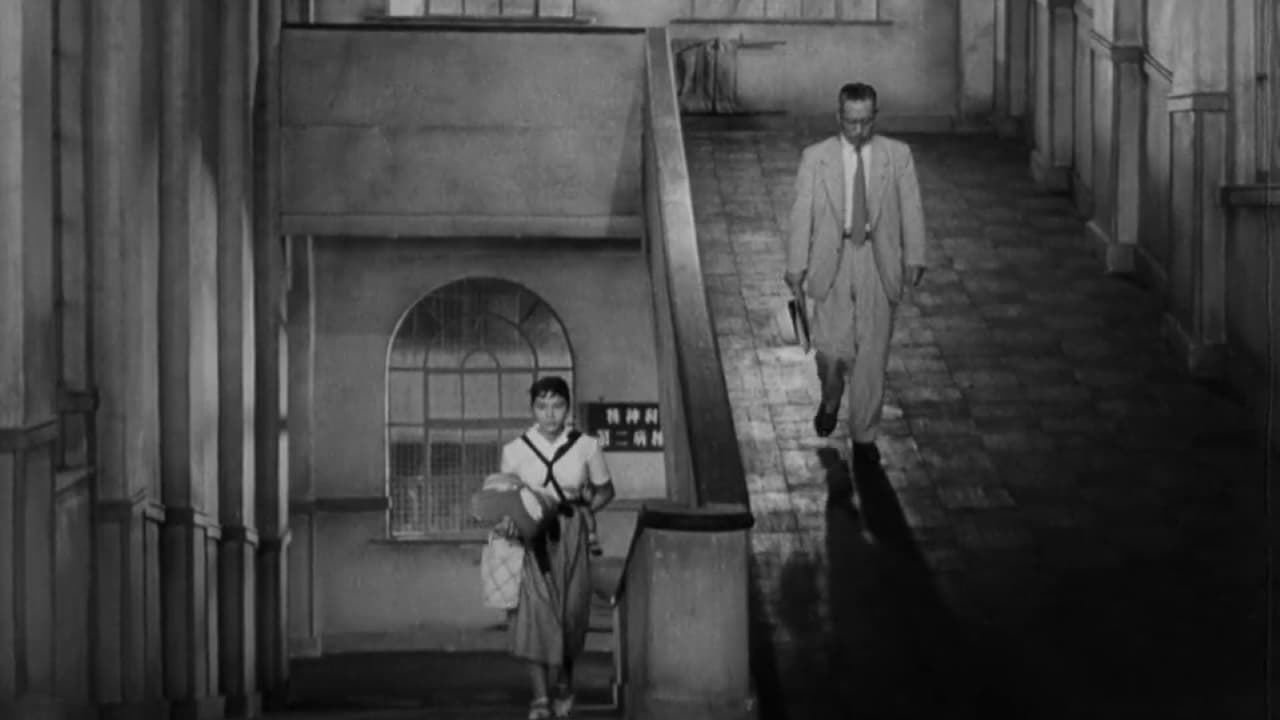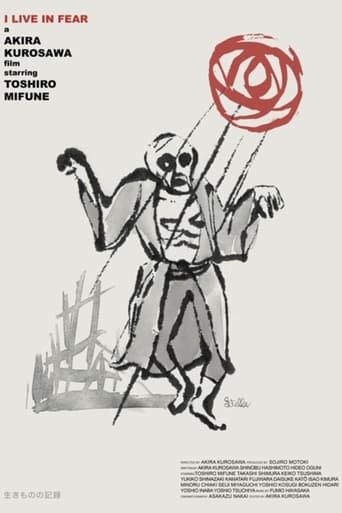



Self-important, over-dramatic, uninspired.
The film makes a home in your brain and the only cure is to see it again.
View MoreI wanted to like it more than I actually did... But much of the humor totally escaped me and I walked out only mildly impressed.
View MoreThere is, somehow, an interesting story here, as well as some good acting. There are also some good scenes
View MoreIn 1950s Japan, a local magistrate (Takashi Shimura) resides over the case of Kiichi Nakajima (Toshirô Mifune), an old man who's so spooked by the prospect of nuclear fallout that he intends to sell his assets and emigrate his large family to Brazil. The family, of course, has other ideas, and seek to have their father declared insane. Though the magistrate reluctantly votes to freeze the old man's assets, he himself becomes troubled by the possibility of nuclear apocalypse. Given what had happened in Nagasaki and Hiroshima, I wouldn't be surprised if such sentiment was widespread in Japan.Mifune, then aged just 35, is completely convincing (under copious amounts of make-up) as the aging, increasingly-paranoid patriarch. Indeed, I didn't realise it was him until I looked up the film's IMDb page. The performance itself is pure ham, not unlike something Klaus Kinski or Jack Nicholson might have conjured up, but there's such intensity in his inner anguish that he is almost painful to watch. The old man's fear of nuclear holocaust ultimately leads him to a mental institution, but Kurosawa blurs his insanity: is he crazy, or is everybody else crazy for not being scared?One scene I found particularly touching. After the old man suffers a serious heart attack, his family gathers around to discuss money arrangements should he die. Meanwhile, the youngest daughter, perhaps the only family member who sympathises with her father's plans, leafs through a photo album. On every page, we find smiling faces, a happy family. It suddenly struck me that, until then, I'd scarcely scene a smiling face for the entire film. Perhaps more than anything, 'I Live in Fear (1955)' is about the breakup of a family, the rupture of a social unit traditionally considered invulnerable.
View MoreFrom the very very beginning during the opening credits sequence, we are given the ominous feeling of paranoia, the feeling with which it's vital to sympathize with Toshiro Mifune's character, an old foundry owner convinced that Japan is on the brink of nuclear obliteration, trying to force his reluctant and resentful family to safety in Brazil.Mifune's performance is so very masculine and real, as are nearly all of them. In this film, he displays a self-assurance that allows him to descend into pathetic helplessness. Of all the post-war Kurosawa films that I've seen so far, I Live In Fear is the most direct and informative. America may feed off of the dread showcased by the Japanese culture in this film and some may feel terribly sad for the individualistic portrayal of the debilitating fear stricken into the immovable hearts of stubborn old men like Mifune's character.Even as early as WWII, I learned, America's most powerful weapon has been fear. However, in those times, it was a much purer, less vain utility. But what about the people it destroys for the sake of its own feeling of security?
View MoreI Live in Fear is yet another masterpiece by Akira Kurosawa. It tells the story of an aging patriarch who is terrified nuclear attack will destroy his family and the business he has worked to build up his entire life. His children do not wish to leave the comfortable life in Japan which his labours have provided. They believe he is mad and take him to family court for mediation. It becomes the difficult duty of a mediator to decide whether his fears are rational or not. The shadow of Hiroshima and Nagasaki are palpable in the feverish eyes of legendary actor Toshiro Mifune as the father. A thought-provoking time capsule of post-war Japan, the combination of Kurosawa and Mifune should never be missed.
View MoreUnique and unforgettable ! Scenes that will literally haunt you with beauty, shock, and raw emotion. Unfortunately, rather contemporary due to it's threatening storyline of fear by nuclear attack. Superb ensemble acting with Mifune at peak intensity. Not a wasted shot with hypnotic direction by Kurosawa.
View More